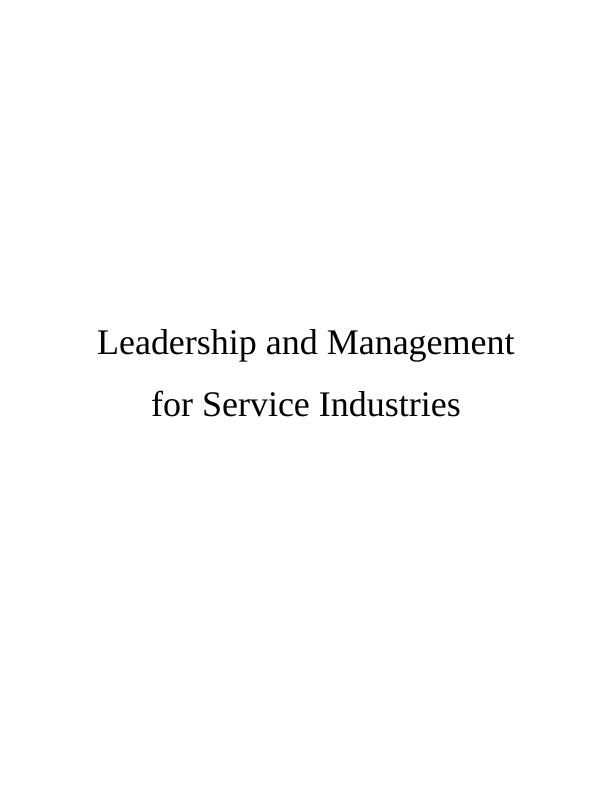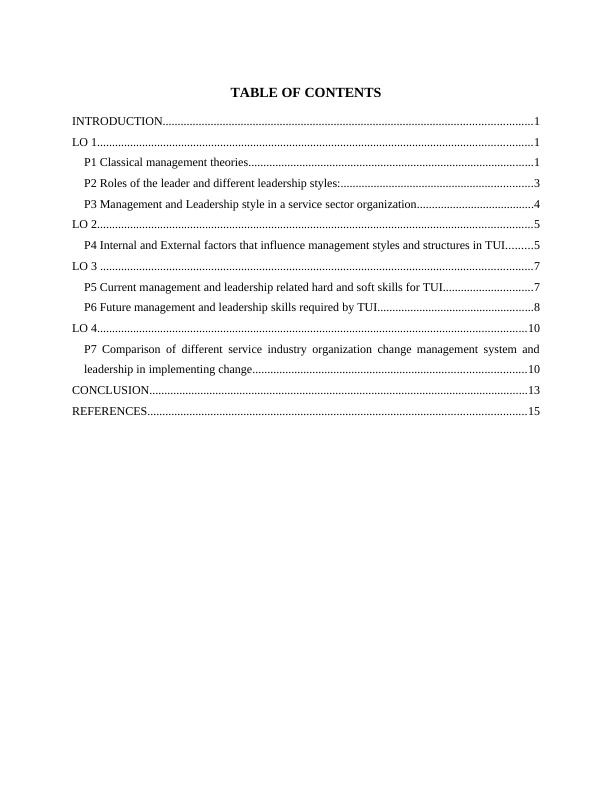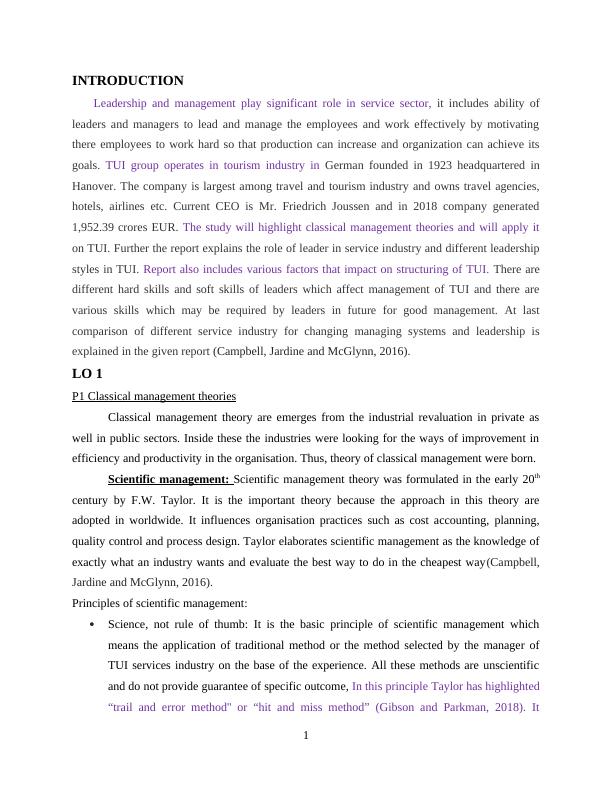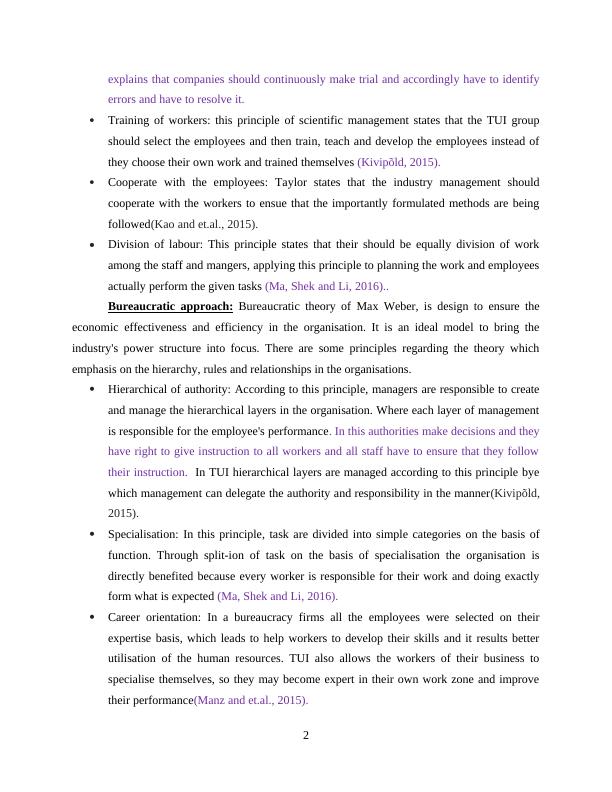Leadership & Management for Service Industries- Doc
Added on 2021-02-20
18 Pages5618 Words51 Views
Leadership and Managementfor Service Industries

TABLE OF CONTENTSINTRODUCTION...........................................................................................................................1LO 1.................................................................................................................................................1P1 Classical management theories...............................................................................................1P2 Roles of the leader and different leadership styles:................................................................3P3 Management and Leadership style in a service sector organization.......................................4LO 2.................................................................................................................................................5P4 Internal and External factors that influence management styles and structures in TUI.........5LO 3 ................................................................................................................................................7P5 Current management and leadership related hard and soft skills for TUI..............................7P6 Future management and leadership skills required by TUI....................................................8LO 4...............................................................................................................................................10P7 Comparison of different service industry organization change management system andleadership in implementing change...........................................................................................10CONCLUSION..............................................................................................................................13REFERENCES..............................................................................................................................15

INTRODUCTIONLeadership and management play significant role in service sector, it includes ability ofleaders and managers to lead and manage the employees and work effectively by motivatingthere employees to work hard so that production can increase and organization can achieve itsgoals. TUI group operates in tourism industry in German founded in 1923 headquartered inHanover. The company is largest among travel and tourism industry and owns travel agencies,hotels, airlines etc. Current CEO is Mr. Friedrich Joussen and in 2018 company generated1,952.39 crores EUR. The study will highlight classical management theories and will apply iton TUI. Further the report explains the role of leader in service industry and different leadershipstyles in TUI. Report also includes various factors that impact on structuring of TUI. There aredifferent hard skills and soft skills of leaders which affect management of TUI and there arevarious skills which may be required by leaders in future for good management. At lastcomparison of different service industry for changing managing systems and leadership isexplained in the given report (Campbell, Jardine and McGlynn, 2016).LO 1P1 Classical management theoriesClassical management theory are emerges from the industrial revaluation in private aswell in public sectors. Inside these the industries were looking for the ways of improvement inefficiency and productivity in the organisation. Thus, theory of classical management were born.Scientific management: Scientific management theory was formulated in the early 20thcentury by F.W. Taylor. It is the important theory because the approach in this theory areadopted in worldwide. It influences organisation practices such as cost accounting, planning,quality control and process design. Taylor elaborates scientific management as the knowledge ofexactly what an industry wants and evaluate the best way to do in the cheapest way(Campbell,Jardine and McGlynn, 2016).Principles of scientific management: Science, not rule of thumb: It is the basic principle of scientific management whichmeans the application of traditional method or the method selected by the manager ofTUI services industry on the base of the experience. All these methods are unscientificand do not provide guarantee of specific outcome, In this principle Taylor has highlighted“trail and error method'' or “hit and miss method” (Gibson and Parkman, 2018). It1

explains that companies should continuously make trial and accordingly have to identifyerrors and have to resolve it.Training of workers: this principle of scientific management states that the TUI groupshould select the employees and then train, teach and develop the employees instead ofthey choose their own work and trained themselves (Kivipõld, 2015).Cooperate with the employees: Taylor states that the industry management shouldcooperate with the workers to ensue that the importantly formulated methods are beingfollowed(Kao and et.al., 2015).Division of labour: This principle states that their should be equally division of workamong the staff and mangers, applying this principle to planning the work and employeesactually perform the given tasks (Ma, Shek and Li, 2016)..Bureaucratic approach: Bureaucratic theory of Max Weber, is design to ensure theeconomic effectiveness and efficiency in the organisation. It is an ideal model to bring theindustry's power structure into focus. There are some principles regarding the theory whichemphasis on the hierarchy, rules and relationships in the organisations. Hierarchical of authority: According to this principle, managers are responsible to createand manage the hierarchical layers in the organisation. Where each layer of managementis responsible for the employee's performance. In this authorities make decisions and theyhave right to give instruction to all workers and all staff have to ensure that they followtheir instruction. In TUI hierarchical layers are managed according to this principle byewhich management can delegate the authority and responsibility in the manner(Kivipõld,2015).Specialisation: In this principle, task are divided into simple categories on the basis offunction. Through split-ion of task on the basis of specialisation the organisation isdirectly benefited because every worker is responsible for their work and doing exactlyform what is expected(Ma, Shek and Li, 2016). Career orientation: In a bureaucracy firms all the employees were selected on theirexpertise basis, which leads to help workers to develop their skills and it results betterutilisation of the human resources. TUI also allows the workers of their business tospecialise themselves, so they may become expert in their own work zone and improvetheir performance(Manz and et.al., 2015).2

End of preview
Want to access all the pages? Upload your documents or become a member.
Related Documents
Leadership and Management for Service Industries Assignment Samplelg...
|15
|5037
|31
Leadership & Management in Contemporary hospitalitylg...
|12
|2937
|55
Leadership and Management for Service Industrieslg...
|8
|484
|86
Unit 5: Leadership and Management for Service Industrieslg...
|11
|2200
|456
Leadership Management for Service Assignmentlg...
|20
|6997
|19
(solved) Leadership and Management for Service Industries : Doclg...
|10
|1791
|469
